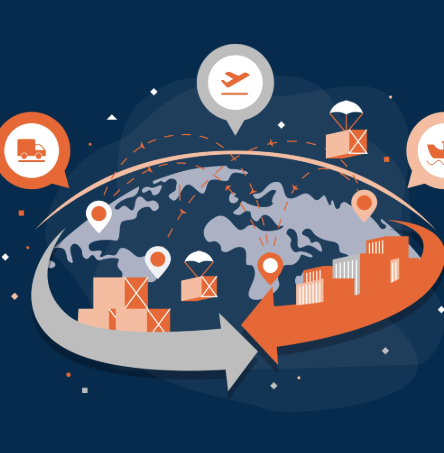Harnessing AI to Transform Predictive Demand Forecasting in Logistics

The logistics industry is vital in ensuring the smooth flow of goods across the world, yet it faces numerous challenges. As consumer demands evolve and supply chains become more complex, logistics companies must adapt to stay competitive. One way to address these challenges is through the integration of Artificial Intelligence (AI), which has the potential to revolutionize how logistics companies operate, particularly in predictive demand forecasting.
AI offers innovative solutions to help companies forecast demand more accurately, optimize inventory management, and improve operational efficiency. This blog explores the evolving role of AI in logistics, how it enhances demand forecasting, and the future impact on supply chains.
The Current State of AI in Logistics
AI is making significant strides in the logistics sector. Today, AI-driven systems are improving various aspects of logistics operations, from route optimization to warehouse management. When it comes to demand forecasting, AI’s ability to analyze vast amounts of historical and real-time data is transforming inventory management practices. AI-powered systems take into account factors such as market trends, consumer behavior, weather conditions, and even social media activity to predict demand with high precision.
For logistics companies, this predictive capability is a game changer. AI helps them minimize stockouts and overstock situations, which in turn reduces costs, improves service delivery, and enhances customer satisfaction. With AI, businesses can ensure that the right products are available at the right time, without the risk of excess inventory sitting in warehouses for too long.
Key Benefits of AI in Predictive Demand Forecasting
- Improved Inventory Management
AI helps logistics companies strike the perfect balance between supply and demand. Traditional methods often lead to excess inventory or shortages, both of which can be costly. AI-driven forecasting ensures that products are available when needed, but without overstocking, reducing warehousing costs and minimizing waste. - Cost Reduction
By accurately predicting future demand, AI allows logistics firms to allocate resources more efficiently. Whether it’s labor, warehouse space, or transportation capacity, AI helps minimize unnecessary spending and ensures that resources are optimized. Companies can save on transportation costs, prevent waste, and reduce operational overhead. - Enhanced Customer Satisfaction
Consumers today expect fast and reliable delivery. AI’s ability to predict demand and optimize supply chains ensures that businesses meet customer expectations consistently. Predictive forecasting enables timely product availability, reducing the chances of delays or missed deliveries, which boosts customer loyalty. - Better Decision Making
AI tools analyze historical data and spot trends that may not be visible to human planners. This improves decision-making accuracy, allowing businesses to forecast demand more reliably. Better forecasting leads to smarter purchasing, inventory, and marketing decisions, all contributing to overall business efficiency.
How AI Is Revolutionizing Logistics Beyond Demand Forecasting
While demand forecasting is one of the most significant applications of AI in logistics, AI is also transforming other aspects of the supply chain.
- Route Optimization
AI uses real-time data such as weather, traffic patterns, and vehicle performance to determine the most efficient delivery routes. This reduces fuel consumption, cuts down on delivery times, and lowers overall emissions. Additionally, AI can dynamically adjust routes in real time to respond to changing conditions, enhancing operational flexibility. - Warehouse Automation
Robots powered by AI are revolutionizing warehouse operations. These autonomous systems can handle tasks such as picking, packing, and sorting, improving efficiency and accuracy. AI-driven automation reduces the need for human intervention, cutting labor costs and minimizing errors, which results in faster order fulfillment. - Enhanced Tracking and Visibility
AI enhances supply chain visibility by integrating data from GPS and IoT devices. This allows logistics companies to track shipments in real time, anticipate delays, and proactively address issues before they affect the customer. With real-time updates, companies can offer precise delivery estimates, improving transparency and customer experience.
The Future of AI in Logistics: Emerging Technologies
The impact of AI on logistics is just beginning. Looking ahead, the logistics sector will see even greater advancements with the integration of new technologies.
- Autonomous Vehicles and Drones
Self-driving trucks and drones are set to disrupt the logistics industry. These technologies reduce human error, lower transportation costs, and improve safety. Drones, in particular, are ideal for last-mile delivery, especially in urban areas or locations that are difficult to reach. Autonomous vehicles can also optimize their routes using AI, minimizing delays and maximizing fuel efficiency. - Quantum Computing
Quantum computing holds the potential to solve complex logistics problems by processing vast amounts of data at unprecedented speeds. This will enable real-time simulations of supply chain scenarios, helping logistics companies optimize every step of their operations, from route planning to inventory management. - Blockchain Integration
Blockchain technology, when combined with AI, can improve transparency and traceability in the logistics sector. AI can analyze data stored on blockchain systems, allowing businesses to identify potential disruptions and resolve issues more effectively. This integration enhances supply chain visibility, ensuring that goods are tracked and authenticated from origin to destination.
The Impact of AI on Customer Experience
AI is also reshaping the customer experience in logistics. AI-driven virtual assistants and chatbots provide real-time updates, allowing customers to track their orders, resolve issues, and make inquiries easily. These assistants use natural language processing to understand and respond to customer queries, providing personalized support and improving overall satisfaction.
Looking Ahead: A Smarter, More Efficient Logistics Industry
AI is already driving significant improvements in logistics, and its influence will only continue to grow. From predictive demand forecasting to autonomous vehicles, AI is making supply chains more efficient, sustainable, and responsive to customer needs. Logistics companies that embrace these technologies will not only reduce costs and improve operational efficiency but also enhance their customer experience, staying ahead in an increasingly competitive market. The future of AI in logistics is bright, and those who adapt early will lead the way in transforming the industry.




